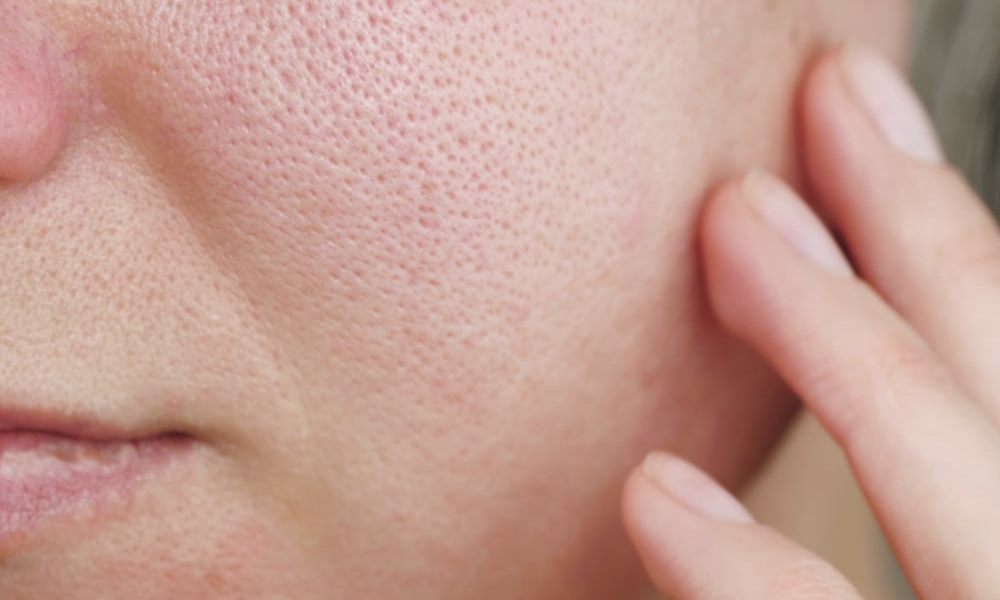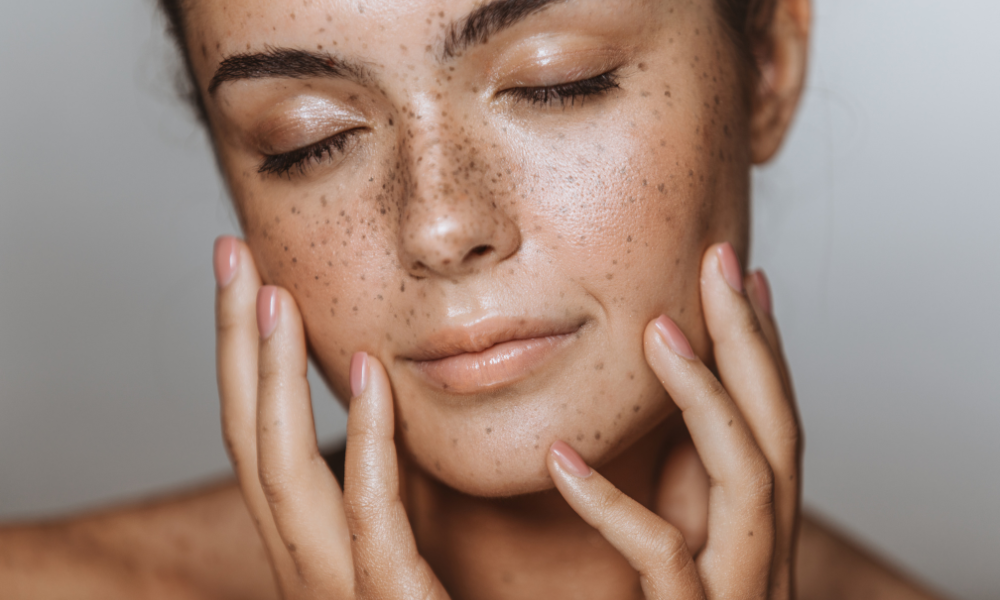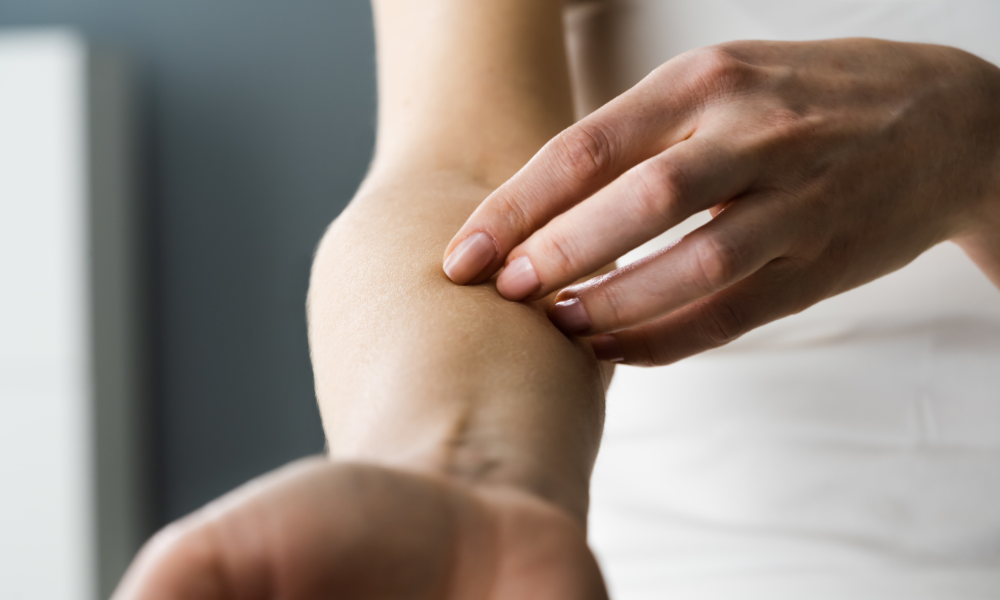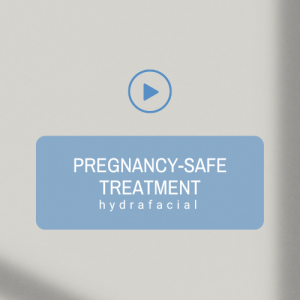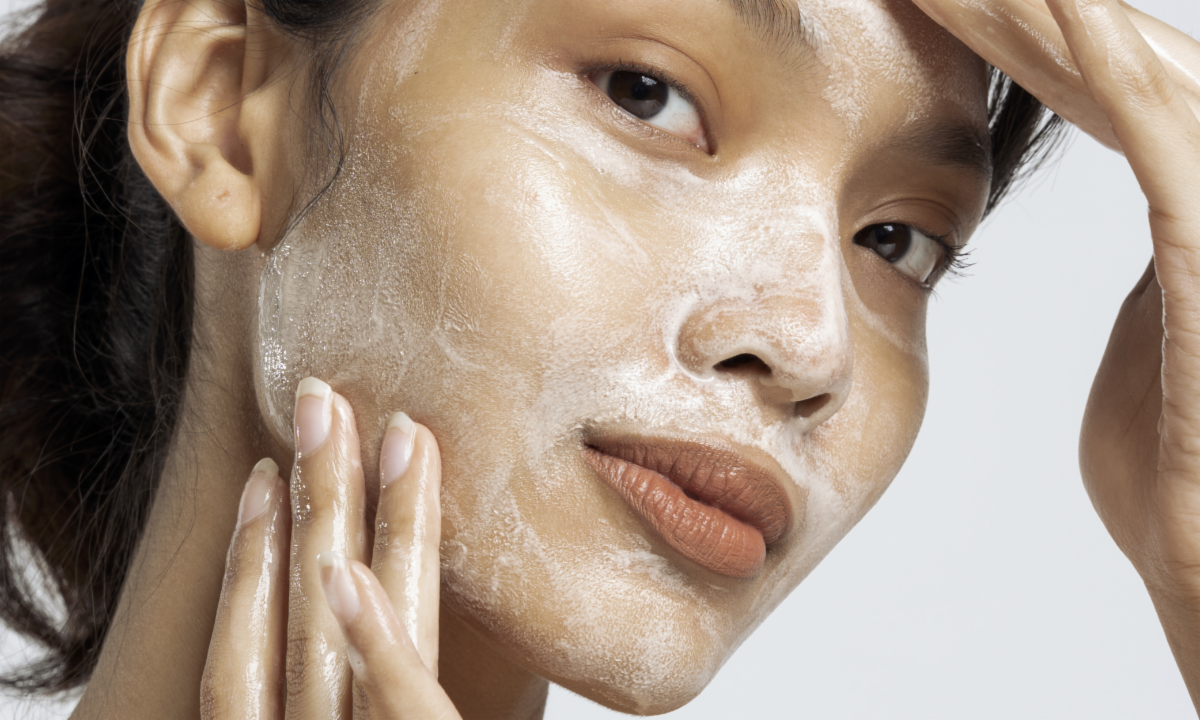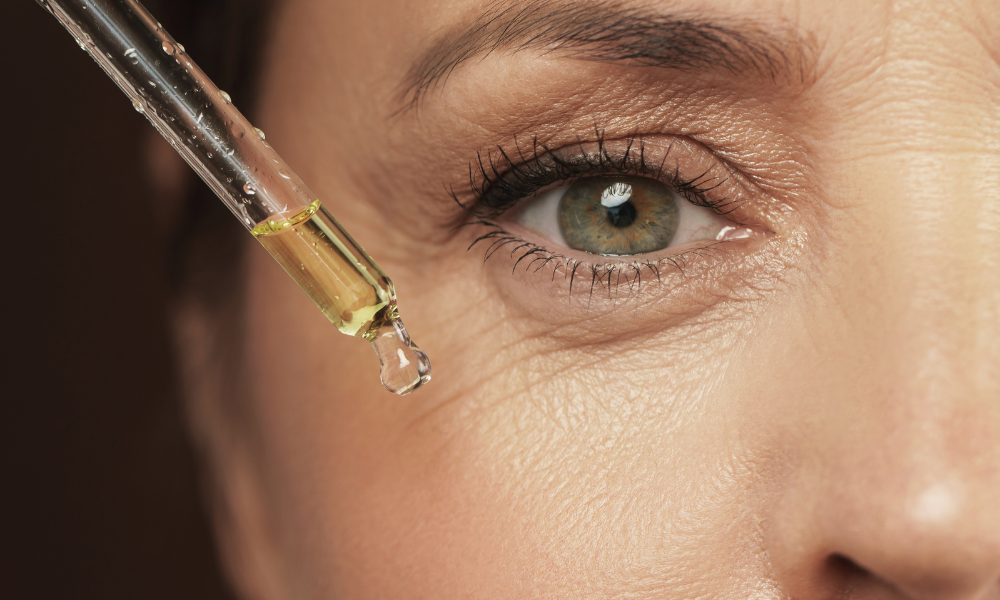Large Pores? Pure Dermatology Can Help!
Pores can get enlarged when they’re clogged with dirt, oil, dead skin cells, or other debris. Additionally, as part of the aging process and sun damage our skin loses some of its structural support from collagen and elastin which can cause pores to enlarge over time. Large pores can be a frustrating skin concern but there are several steps you can take to minimize their appearance.
Check out some at-home and in-office tips from our team of board-certified dermatologists and aesthetician to combat this common skin concern.
Follow a comprehensive skin care routine at home.
- Cleanser: Keep your skin clean by washing your face twice a day and after exercise with a non-comedogenic, gentle cleanser or a cleanser containing salicylic acid.
- Exfoliator: Introduce an exfoliator. Exfoliating once or twice a week can help remove dead skin cells that can clog pores and make them appear larger.
- Toner: Using a toner with alpha or beta hydroxy acids can help reduce the appearance of large pores by removing excess oil and debris.
- Retinol: Incorporating a retinol product into your skincare routine can improve skin texture and reduce the appearance of pores over time.
- Sunscreen: Protect your skin from the sun with a daily broad-spectrum SPF prevents the breakdown of collagen and elastin, which can contribute to larger pores.
Treat and manage acne.
- Acne clogs your pores making them appear more noticeable.
- Inflammation from acne causes dilation of the follicle which leads to enlargement on the pores.
- Schedule an appointment with one of our board-certified dermatologists to get a customized Rx and non-Rx treatment regimen for your acne whether it is mild and intermittent or constant and more severe.
Be gentle with your skin.
- Scrubbing your face won’t make it cleaner, but scrubbing can irritate your skin making your pores look larger.
- Picking, squeezing, or digging into your pores can also irritate your skin, making pores look more noticeable and sometimes cause scarring.
Explore in-office treatments.
- Facial Peels: Medical-grade facial peels with ingredients such as Glycolic, Salicylic and Lactic acid can help slough away layers of old skin to reveal smooth new skin and tighter pores.
- See our Perfect Derma Peel featured in our aestheticians corner below.
- SilkPeel: A gentle process of exfoliation, infusion, and extraction in one simultaneous treatment through the use of specifically formulated serums targeted to treat problems of the skin.
- Hydrafacial: Patented technology to cleanse, extract, and hydrate, infusion of super serums and application of LED light therapy, gently exfoliate and leave your skin moisturized and glowing.
- Microdermabrasion: A non-invasive exfoliating procedure that can be added on to any facial, and will help to improve uneven skin texture and tone for a brighter and smoother complexion.
If you have questions about how to manage your large pores, see one of our board-certified dermatologists or licensed aesthetician. They will evaluate your skin and develop a treatment plan and regimen just for you.
Favorite Products to Treat Large Pores

Cleansers:
- SkinCeuticals® Simply Clean – Gel cleanser for normal, combination or oily skin.
- Senté Daily Soothing Cleanser – Calms and helps reduce visible redness with the nourishing properties of vitamin E and green tea extract.

Exfoliants:
- Senté Exfoliating Cleanser – For sensitive skin uses gentle ingredients like phytic acid and glycolic acid to reveal a smoother, brighter-looking complexion. Ideal for redness and irritation-prone skin, using just once or twice per week.
- Micro Exfoliating Scrub – Gentle scrub delivers a mild and even exfoliation to improve texture and hydrate skin with silica, glycerin, and aloe leaf extract

Sun Protection:
- Alastin Renewal Retinol 0.5 – Smooths skin texture and helps improve skin tone, calms sensitive skin with anti-irritants and antioxidants.
- Avène Retrinal 0.05 Cream / 0.1 Intensive Cream – Visibly reduces wrinkles while smoothing and renewing skin.
- Tretinoin (by prescription only) – A derivative of vitamin A, known as a retinoid, fights acne, and helps improve fine lines and dark spots.

Sun Protection:
- EltaMD UV Clear SPF 46 – Lightweight sun protection of oily skin prone to acne and rosacea.
- ISDIN Eryfotona Actinica SPF 50+ – Ultralight Emulsion with DNA Repairsomes®, all mineral, water resistant for everyday use.
Browse Our Selection of Skin Care Products
Aesthetician Corner
When home care and proper medical-grade skin care is not enough, you may want to look into treatment options for your enlarged pores. Learn more about one of our favorite peels, The Perfect Derma™ Peel.

The Perfect Derma™ Peel is safe, effective medium depth peel for all skin types and ethnicities. This product is virtually painless, with no pre-peel skin preparation and little downtime. Reduce enlarged pores and build collagen and elastin for a healthier, firmer complexion.
Benefits:
- Reduce the appearance of pore size
- Improve the overall clarity, tone and texture of the skin
- Reduce or eliminate hyperpigmentation, sun damage and Melasma
- Improve acneic skin conditions and reduce acne scars
- Stimulate the production of collagen, resulting in firmer, more youthful skin
Ingredients: TCA, Retinoic Acid, Salicylic Acid, Kojic Acid, Phenol, Glutathione and Vitamin C.

New Year, Same GREAT Care!
At the start of a new year, many of us make resolutions to take better care of ourselves. If your goal is to improve your skin, we are here to help!

Let's start 2024 the right way, it's important to prioritize your health and well-being. Our team of board-certified dermatologists offers comprehensive skin checks to screen for skin cancers and ensure your skin is healthy and protected. Our goal is to provide top-notch patient care and detect and treat any potential skin issues.
Schedule your skin check today to start the new year with peace of mind and healthy skin.

Are You Ready For Your Appointment?
With the start of the new year, there may be changes to your insurance plan or cards.
- Please bring to all appointments: a photo ID, an insurance card(s), and a valid form of payment, even if you are an established patient.
- If your insurance requires a referral, please request one from your primary care doctor prior to your visit.
This will ensure that we have the most current information on file and can provide you with the best possible care. Thank you for your cooperation and we look forward to seeing you soon. Questions? Give our office a call (303-333-7873).
Aesthetician Corner
New Treatment Alert — PRX Derm Perfexion
The PRX Derm Perfexion treatment helps improve the hydration, structure, texture, and pigmentation of your skin. You will see immediate results with no needles, no peeling, no frosting, and no photosensitivity. It is truly a zero-down-time innovation in aesthetic medicine.
PRX Derm Perfexion contains a proprietary blend of proven ingredients that work together to improve the quality and texture of the skin. Its formula contains 33% trichloroacetic acid (TCA), hydrogen peroxide, and kojic acid. When applied to the skin, PRX penetrates deeply to the dermis level stimulating collagen, while leaving the epidermis intact. The patented formula, application, and treatment protocol give your complexion a healthy glow without the risks or side effects of traditional peels.
PRX Derm Perfexion Highlights:
-
- Great for all skin types and ages
- Improve skin laxity, pigmentation, wrinkles, scarring, and stretch marks
- No needles
- No peeling
- No downtime (great before vacation or events)
- Immediate and long-lasting results
- 15 to 30 minute procedure, performed one time per week for four weeks (four sessions per package)



Get Glowing Skin!
Are you feeling the effects of winter on your skin? Dryness, flakiness, and a lackluster appearance are common during this time of year. But don't worry, we are here to help! Here are some simple tips to combat dry winter weather and keep your skin glowing all season long.
Use gentle, non-fragranced soap or moisturizing non-soap cleansers.
- Harsh soaps can strip the natural oils from the skin, leading to dryness and irritation.
Apply the right products.
- Moisturizer is best applied right after your bath or shower, when the skin is moist, your pores are open and will trap in moisture.
- Choose a cream over lotion. Cream-based moisturizers contain more oil and less water than lotions; lotions are thinner (more water) and less hydrating than creams.
- Consider a skin product that contains Hyaluronic Acid. Hyaluronic acid (HA) is one of the hottest ingredients in skincare right now — and for good reason. It has the power to thoroughly hydrate, making skin look instantly dewy and plump, while decreasing the appearance of roughness, fine lines, and wrinkles.
Stay hydrated by drinking water throughout the day and use a humidifier.
- Water plumps skin cells and enhances elasticity, it is crucial for keeping skin looking youthful. Dehydrated skin can look dry, wrinkled, and dull.
- Proper water intake helps carry nutrients to skin cells and enhances the effects of topically applied products.
- The heat in your home or office can be very drying; a humidifier helps maintain ideal humidity to combat skin dryness.
Treat yourself to a relaxing facial to combat winter skin dryness.
- Deeply cleanse, exfoliate, and hydrate your skin.
- Our skilled aesthetician, Ashli LaMadrid, will customize a treatment plan to address your specific concerns and leave you with a refreshed, hydrated, and glowing complexion.
- Facials make a great gift! Call our office to purchase today, 303.333.7873.
If you have questions about how to keep your skin refreshed and radiant, see one of our board-certified dermatologists or licensed aesthetician. They will evaluate your skin and develop a regimen just for you.
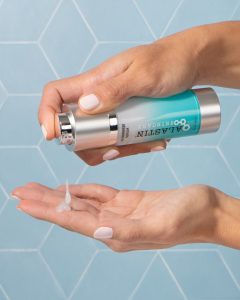
NEW PRODUCT ALERT!
Alastin Skincare's new HA (Hyaluronic Acid) IMMERSE Serum™ is a breakthrough hyaluronic acid serum that delivers instant hydration for smoother, more radiant-looking skin — while helping amplify skin's hyaluronic acid levels over time. The luxurious serum is formulated only with high-molecular weight hyaluronic acid. This form of HA is the same molecular weight as the HA naturally found deep within your skin. That means it delivers the form of HA that your body needs, helping to promote plumper, more hydrated skin in a natural way.
Where Does Hyaluronic Acid Fit Into My Daily Regimen? Typically when you layer on products, you start with the thinnest formula and end with the thickest formula. In the case of HA IMMERSE, this also rings true! You can apply HA IMMERSE immediately after washing and drying your face, then continue on with the rest of your daily regimen.
BENEFITS OF HA IMMERSE SERUM™:
- Helps instantly boost skin hydration at the surface for smoother, more radiant looking skin.
- Proprietary Octapeptide-45 helps the skin’s ability to naturally increase its own high-molecular hyaluronic acid production deep within for long-term skin plumping, anti-aging, and hydration benefits.
- Provides both instant and long-lasting results.
- Helps to increase natural levels of hyaluronic acid in the skin which works to minimize the appearance of fine lines and wrinkles.
AESTHETICIAN CORNER
Need an extra glow, schedule a Clinical Facial!
Our expert aesthetician, Ashli, will provide a customized treatment plan to target your specific skin concerns, leaving you with a hydrated and radiant complexion.
Need the perfect gift? We can help! Give our office a call at 303.333.7873 to purchase facial certificates for everyone on your list, from your mom to your best friend. Treat your loved ones to the ultimate pampering experience! (Meet Ashli LaMadrid)
Our new, clean, non toxic, plant-based line delivers visible results. Check out some of our wide selection of offerings below, we will make sure we use the professional products to best suit your needs and skin goals.
- Floraessence Peel 20% - Hydrate, exfoliate, and increase cell turnover with Lactic Acid and Mandelic Acid.
- Pomegranate Refining Peel 20% - Treat hyperpigmentation and oily acne prone skin with Enzymatic and Alpha Hydroxy.
- Pumpkin Glycolic Peel 3% + 20% - Reduce fine lines, hyperpigmentation, and stimulate cell turnover.
- Clear Complexion Healing Mask - Detox skin and absorb dirt and oil with charcoal and probiotics.
- Potent C Superfood Mask - Help skin cell turn over, brighten skin, and calm blemishes. Spinach and kale oxygenate skin, and Vitamin C brightens.
- Firm Collagen Gel Mask - Firm, plump, and hydrate with Hyaluronic Acid and Niacinamide.
Staff Favorites!
Come see us at Pure Dermatology! Now is the perfect time to discover the best skin care products and procedures to get your skin looking and feeling its best. Learn more about the latest advancements in skin care and receive personalized recommendations from our knowledgeable staff. Whether you're looking to rejuvenate, brighten, or simply maintain your skin's health, we are here to support you.
Check our our staff favorites! Our team has curated a selection of their must-haves that are available for you to try and purchase in our office.
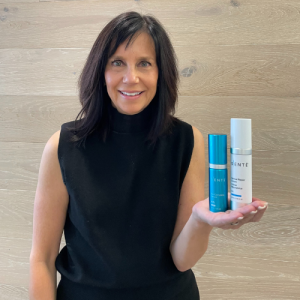
Dr. Cera Hill's Favorite Products:
"My nightly power-duo is from Senté. After prepping my skin, I apply Senté's Bio Complete Serum. It is a gentle vitamin A serum with slow-release retinoids for smoother, younger-looking skin with minimal irritation. Finding a retinol or retinoid product can be difficult if you have sensitive skin but they are so important to include in your routine! I also love their flagship anti-aging topical, Dermal Repair Cream, it renews skin while deeply hydrating and plumping."
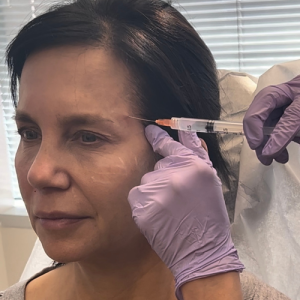
Dr. Cera Hill's Favorite Treatment:
"Have you heard of Sculptra? It is an amazing option for so many of my patients. Sculptra stimulates collagen production, which helps the skin naturally renew itself. Results develop gradually, look completely natural, and last much longer than most other injectables. Swing by our Cosmetic Open House to learn more about one of our favorite treatments!"
October is Eczema Awareness Month
- Eczema is a chronic inflammatory condition of the skin that causes redness, itching, scaling, and dryness.
- It can be a lifelong condition starting in childhood or develop later in life and can range from mild to severe.
- It is more common in Colorado’s dry climate.
- If you are suffering from eczema, take charge of your skin's health by learning more about this condition and the available treatment options at Pure Dermatology Denver.
TYPES OF ECZEMA
- Atopic dermatitis (the most common type)
- Hereditary, runs in families and often starts in childhood but can develop later in life.
- Symptoms include dry, scaly, itchy patches on the skin, usually in areas like the inside of elbows, backs of knees, wrists, ankles, face, and neck.
- Contact dermatitis (irritant and allergic)
- It occurs when the skin reacts to irritants or allergens it is exposed to.
- Symptoms include a localized red, itchy rash.
- Common triggers include cosmetic products, certain metals, fragrances, and plants such as poison ivy, etc.
- Dyshidrotic eczema
- Hereditary, occurs at any age.
- Causes tiny blisters and scaling on hands, feet, and fingers that tend to come and go.
- Asteatotic eczema
- Due to excessively dry skin.
- Patches of red scaly and sometimes itchy skin scattered on the body, arms, and legs.
SYMPTOMS OF ECZEMA
- Itching: Can be mild or severe, and may worsen at night. The more you scratch, the more it itches, and can lead to skin damage and infection.
- Redness: Areas affected by eczema often appear pink or red and inflamed.
- Dryness: The skin tends to be very dry, cracked, and scaly. Lack of moisture is a key problem in eczema.
- Flaking/scaling: Flaking and peeling of the outer skin layers is common, especially after scratching.
- Lichenification: Thickening of the skin, usually as a result of chronic rubbing or scratching.
- Cracked skin: The dryness associated with eczema can cause the skin to crack open painfully. Common on fingertips, hands, and feet.
- Skin discoloration: Affected areas may turn lighter or darker than their normal skin tone.
ECZEMA TREATMENTS
- Rx topical corticosteroids creams
- First-line treatment anti-inflammatory creams and ointments that reduce inflammation and itch.
- They work quickly and are great for intermittent short-term treatment.
- Rx topical non-steroidal creams
- Great new options available that are safe and effective.
- Perfect for maintenance of eczema to avoid long-term effects of topical steroids.
- Moisturizers
- Daily moisturization with a hydrating cream (not lotion) is key to the treatment and prevention of the recurrence of eczema, especially in dry Colorado weather.
- Favorites: Cetaphil Moisturizing Cream, CeraVe Moisturizing Cream, Eucerin Eczema Relief Cream.
- Systemic medications
- For severe cases and cases that are difficult to control with topical treatments.
- Oral and injectable medication options that can be life-changing for people with chronic eczema.
Our team of board-certified dermatologists and aestheticians will educate you on proper prescription and over the counter skin care and how to identify and avoid triggers. If you have questions about what products or treatments are right for you, schedule an appointment with our team.
PRODUCT RECOMMENDATIONS

EltaMD Moisture Rich Body Crème
- Colorado dry weather makes it hard to avoid dry skin. You will absolutely love the feel and effects of this cream!

EltaMD So Silky Hand Crème
- The perfect product to carry around in your purse or keep on your desk or in your car to use multiple times per day. It is moisturizing but not greasy or sticky.
Stop by Pure Dermatology to test or purchase either of these great products!
AESTHETICIAN CORNER
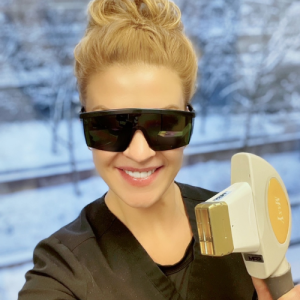
Treatment Spotlight - IPL (Intense Pulsed Light)
It may be helpful for managing atopic dermatitis and other types of eczema characterized by skin inflammation, especially when standard topical steroids have not been fully effective.
IPL emits wavelengths of light that target hemoglobin in dilated blood vessels associated with inflammation. This helps reduce redness, swelling, and irritation.
Treatment involves multiple sessions spaced several weeks apart. A handheld wand is used to deliver pulses of light to affected areas of skin for just seconds at a time. Sessions last 15-30 minutes, depending on the area size.
IPL Benefits:
- Non-invasive
- Non-ablative
- Reduces inflammation
- Kills bacteria
- Smoothes skin surface
- Promotes collagen production
- Minimal downtime
Schedule a FREE aesthetician consult to see if IPL would be a good treatment option to reach your skin care goals.
HOW TO: Prevent Premature Skin Aging
Are you worried about premature skin aging? Don't panic! With a few simple steps, you can keep your skin looking youthful and healthy.
7 WAYS TO REDUCE PREMATURE AGING
Protect your skin from the sun every day.
- Wearing SPF 30 or higher on your face, neck and chest on a daily basis is the best thing you can do to prevent aging of your skin and keep it looking young. Whether spending a day in the sun or simply running errands, sun protection is essential.
- You can also protect your skin by seeking shade and covering up with UPF clothing — such as a lightweight and long-sleeved shirt, pants, a wide-brimmed hat, and sunglasses.
Consider using a retinol or Rx Tretinoin cream.
- Should you be using a retinol or retinoid? Yes, yes and yes! Aside from SPF, retinoids are the #1 product for promoting long-term skin health across all skin types.
- Retinoids are vitamin A derivatives that increase cellular turnover, which causes our skin to regenerate more quickly, thus making your skin look more youthful, vibrant, and refreshed.
- The umbrella term “retinoid” is used for all vitamin A derivatives (ex: OTC retinol and retinaL, and prescription strength Tretinoin). What differentiates them is their strength, or how many conversions they must go through to become active and effective on the skin.
- The only negative is that these products can be drying and irritating so you need to pick the right product for your skin type. See our Aesthetician Corner below for some tips or schedule a free aesthetician consult to find the right product for you.
Vitamin C, your new bff.
- An anti-aging ingredient everyone should be using every morning! Vitamin C's strength is prevention and protection, it is essential for healthy skin.
- This antioxidant fights free radical damage and prevents oxidative damage to the skin cells. Free radicals get produced in our skin daily from UV exposure, environmental toxins/air pollution and household chemicals. Damage caused by free radicals can affect our skin DNA in addition to breaking down our skin's collagen, which can lead to skin cancers, fine lines and wrinkles, dark spots, and loose, saggy skin. Using a vitamin C neutralizes the free radicals, preventing this type of damage.
- Vitamin C brightens the skin and improves skin texture. It fades hyperpigmentation (sun spots, melasma, and post-acne marks) by inhibiting melanin production and decreases inflammation creating a more even complexion.
Cleanse and moisturize your skin daily.
- Gentle washing helps to remove pollution, makeup, and other substances without irritation. We recommend washing your face twice daily and after sweating.
- Applying a moisturizer immediately after cleansing traps moisture in the skin and gives it a more glowing plump appearance.
Apply self-tanner rather than tanning.
- Every time you get a tan, you age your skin. This holds true if you get a tan from the sun or a tanning bed.
- All tanning methods emit harmful UV rays that in addition to causing skin cancers, breakdown collagen and elastin in the deeper layers of the skin which can cause skin to thin and become wrinkled and crepy over time.
Maintain a healthy lifestyle.
- Eating plenty of fresh fruits and vegetables that contain antioxidants may help prevent damage that leads to premature skin aging.
- Exercising daily can improve circulation and boost the immune system which may give the skin a more youthful appearance.
- Avoid smoking, and drink alcohol in moderation, as these are damaging to skin health.
Stay hydrated by drinking water throughout the day.
- Water plumps skin cells and enhances elasticity, it is crucial for keeping skin looking youthful. Dehydrated skin can look dry, wrinkled and dull.
- Proper water intake helps carry nutrients to skin cells and enhances the effects of topically applied products.
If you have questions about what products or treatments are right for you, see one of our board-certified dermatologists or licensed aestheticians. They will evaluate your skin and develop a regimen curated just for you.
NEW PRODUCT ALERT!

ALASTIN Skincare®️’s C-RADICAL Defense Antioxidant Serum is powered by a proprietary, encapsulated Vitamin C (Sodium Ascorbate). This clinically-proven formula provides comprehensive environmental protection and supports the skin’s ability to conserve elastin for skin that looks smoother and more radiant (purchase now).
In a Clinical Study, C-RADICAL showed the following in as early as 8 weeks:
- 71% reduction in the appearance of uneven skin texture
- 69% reduction in the appearance of redness
- 50% reduction in the appearance of fine lines
HELPS TO:
- Protect skin from environmental stressors such as free radicals & UV damage
- Stimulate collagen and conserve elastin
- Improve the appearance of skin tone, texture, firmness, and luminosity
- Reduce the appearance of fine lines, wrinkles, redness, and hyperpigmentation
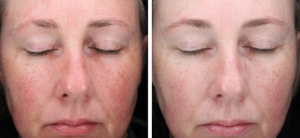
AESTHETICIAN CORNER
What are the benefits of retinoids?
- Reduces the appearance of fine lines + wrinkles by increasing collagen production
- Improves skin tone + texture for smoother, firmer looking skin
- Aids in fading sun spots and smoothing out rough patches on the skin
- Increases cellular turnover, which can minimize breakouts
- Stimulates production of new blood vessels on the skin, which improves the color of the skin
Do I need to use a retinoid?
Retinoids help keep our skin looking younger and healthier. We recommend that everyone over the age of 25 should use one. Plus, if you struggle with acne at any age, retinoids are one of our most recommended treatments!
To get the most of any retinoid, frequent use is key! The best retinoid is the one you will use consistently, which would ideally be 5-7 nights per week. Retinoids are the most highly researched “anti-aging" topical in the market (with over 70+ years of data) showing that the 5-7 nights range will have the most impact on your skin.
Schedule a FREE aesthetician consult to have us help you select the best retinoid for your skin type that you can tolerate and use regularly.
Skin Tips During Pregnancy
Pregnancy can affect skin in many different ways and can cause some new conditions to appear and others to flare. Additionally, not all prescriptions, products and procedures are safe to use during pregnancy, but many are and our team is here to help.
MELASMA - “The Mask of Pregnancy”
The hormones during pregnancy cause increased melanin production that causes natural darkening of certain areas of the skin, but in some women it can also cause unwanted patches of hyperpigmentation mostly on the face.
- Treatments:
- Ingredients to Avoid: Hydroquinone, Tretinoin, and Retinols
- Pregnancy Safe Ingredients: Azelaic acid, Kojic Acid, Vitamin C, Transexamic Acid, and Niacinamide
- Favorite Products: SkinCeuticals Discoloraton Defense, Alastin A-Luminate, and Isdinceutics Melaclear Advanced
- Pregnancy Safe Procedures: Microneedling and Glycolic Acid Peels
ACNE
The hormones during pregnancy in some women can cause increased skin congestion and acne flares especially on the lower face.
- Treatments:
- Ingredients to Avoid: Tretinoin and Retinols, Salicyclic acid, and Benzoyl Peroxide
- Pregnancy Safe Ingredients:
- Rx: Clindamycin lotion, Azelaic acid creams, and Sulfur based products
- OTC: Glycolic acid, Bakuchiol, and Azelaic Acid
- Pregnancy Safe Procedures: SilkPeel Dermalinfusion, HydraFacial, and Glycolic Acid Peels
ECZEMA
Eczema can flare during pregnancy so it is important to use extra moisturization during pregnancy.
- Treatments:
- Favorite Products: Eucerin Eczema Relief Cream, Cetaphil Cream, CeraVe Cream, and Vanicream
SUN PROTECTION
We recommend mineral based rather than chemical sunscreens during pregnancy.
- Favorite Products: EltaMD Elements, Alastin Hydratint, and ISDIN Tinted Ageless SPF 50
OUR PREGNANCY-SAFE DAILY SKIN CARE ROUTINES

DR. JESSICA FARAHI - BOARD CERTIFIED DERMATOLOGIST
AM
- Gentle cleanser - EltaMD Enzyme Foaming Facial Cleanser, SkinCeuticals Gentle Cleanser, or Vanicream Gentle Cleanser (three nice options!)
- Vitamin C - SkinCeuticals CF Phloretin (it is great for anti-aging and discoloration)
- Moisturizer - Alastin Reform & Repair Complex or Senté Dermal Repair Cream (whether you prefer a cream or serum, moisturization is key!)
- Tinted sunscreen - ISDIN Tinted Ageless SPF 50 (it is a must-have at our office!)
PM
At night, I repeat my AM routine but remove Vitamin C and sunscreen. Once per week I exfoliate, I love the SkinCeuticals Micro Exfoliating Scrub.
TREATMENTS
- HydraFacials are a favorite of mine, they are soothing yet invigorating, safe in pregnancy, and customizable for your skin type.
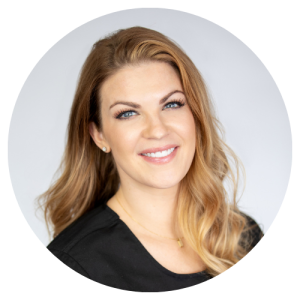
KATIE VELASQUEZ, PMA - LICENSED AESTHETICIAN
AM
- Gentle cleanser - Senté Soothing Cleanser
- Vitamin C - SkinCeuticals CF Phloretin mixed with ISDIN Hyaluronic Concentrate (great combo!)
- Eye cream - Senté Eye Cream
- Moisturizer - Alastin Ultra Light Moisturizer
- Tinted sunscreen - ISDIN Tinted Ageless SPF 50 (perfect coverage with high sun protection)
PM
- Cleanser - EltaMD Enzyme Foaming Face Wash
- Exfoliation - SkinCeuticals Micro Exfoliating Scrub (3 times per week)
- Anti-Aging - Alastin Restorative Complex
- Eye cream - Senté Illuminé Eye Cream (diminishes the appearance of dark circles)
- Moisturizer - Senté Ultra Nourish
TREATMENTS
- HydraFacial or SilkPeel Dermalinfusion are great for hydration and to try keep acne under control.
- Microneedling, SkinPen is pregnancy safe and can help with fine lines and pigmentation.
HYDRAFACIAL
HydraFacial is a comprehensive treatment option for refreshing and rejuvenating the skin, boosting the skin’s health, and improving the complexion. With slight modifications, like omitting salicylic acid, you can enjoy HydraFacials throughout pregnancy and postpartum.
Highlights:
- Clarify blemishes
- Even out skin tone
- Clear away debris from pores
- Can help calm acne during pregnancy
- Great to keep the skin healthy and hydrated giving the skin a dewy and glowing appearance during pregnancy
HOW TO: Exfoliate (for glowy skin!)
Exfoliation is one of the secrets to smooth, soft, and healthy-looking skin from head to toe, but using the right products and treatments is key.
EXFOLIATION TYPES
There are two main methods for exfoliation — mechanical and chemical — and the methods you choose should be guided by your skin type.
Mechanical Exfoliation: Uses a tool, such as a brush, blade, sponge, or scrub to physically remove dead skin cells.
Chemical Exfoliation: Uses chemicals, such as alpha and beta hydroxy acids or retinols to dissolve or gently remove dead skin cells.
HOW TO SAFELY EXFOLIATE AT HOME
To prevent skin damage while exfoliating, our board-certified dermatologists recommend the following:
Consider the skin care products you already use.
Some medications and even over-the-counter products may cause your skin to be more sensitive or peel so you need to be aware of these prior to adding other exfoliation treatments. Examples of these include prescription tretinoin creams, and OTC products containing retinol, benzoyl peroxide, salicylic acid, lactic acid and glycolic acid.
Select an exfoliation method that suits your skin type.
- Dry, sensitive, skin may prefer just a washcloth and a mild chemical exfoliator, as mechanical exfoliation may be too irritating for this skin type.
- Products: Sente Bio Complete Serum, Sente Exfoliating Cleanser
- Procedures: Hydrafacial
- Oily, thicker skin may want to use stronger chemical treatments or mechanical exfoliation.
- Products: Rx Tretinoin, SkinCeuticals Glycolic 10 Renew Overnight
- Procedures: SilkPeel Dermalinfusion
- Darker skin tones need to be aware that too aggressive forms of exfoliation may result in dark spots on the skin called post inflammatory hyperpigmentation
Be gentle with your skin.
- If you use a scrub or chemical exfoliator, apply the product gently using small, circular motions. Do this for about 30 seconds, and then rinse off with lukewarm — not hot — water.
- If you use a brush or sponge, use short, light strokes.
- Never exfoliate if you have open cuts or wounds or if your skin is sunburned.
Follow with moisturizer.
- Exfoliating can be drying to the skin so it is very important to ALWAYS hydrate afterwards.
- Apply a moisturizer immediately after exfoliating to keep your skin healthy and hydrated.
- Dry skin product recommendations: SkinCeuticals Triple Lipid Retore
- Oily skin product recommendations: Alastin Ultra Light Moisturizer
Find the right schedule for you.
- How often you exfoliate depends on your skin type and exfoliation method. Generally, the more aggressive the exfoliation, the less often it needs to be done. Be careful not to over-exfoliate, as this could lead to skin that is red and irritated.
- Dry or sensitive skin types: 1-2 times per week
- Oily or acne prone skin: 3-4 times per week
If you aren’t sure what skin type you have, or if you have questions about exfoliating, see one of our board-certified dermatologists or licensed aestheticians. They will evaluate your skin and help you decide what method of exfoliation will be beneficial for you. Schedule an appointment.
OUR FAVORITE IN-OFFICE EXFOLIATING TREATMENT
SilkPeel Dermalifusion Facial
This is a skin-resurfacing treatment that combines exfoliation, extraction, and infusion of condition-specific serums to improve skin health, function, and glow!
Similar to microdermabrasion, SilkPeel Dermalinfusion exfoliates the upper layers of your skin using a diamond head. Not only does this eliminate dead skin cells, it also delivers a topical solution into the area of the skin where new and healthy skin cells are growing.
BENEFITS:
- Is safe for all skin types
- Has no downtime
- Cleans out pores
- Buffs away wrinkles, fine lines and acne scars while rehydrating dry skin
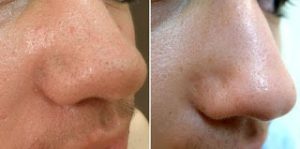
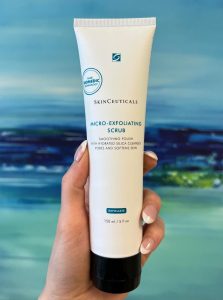
AESTHETICIAN CORNER
Advice from Our Skin Care Specialists - Licensed Aestheticians Katie Velasquez and Ashli La Madrid
SkinCeuticals Micro-Exfoliating Scrub
Smoothing exfoliating scrub with silica effectively cleanses pores and exfoliates to hydrate, soften, and improve skin texture.
We recommend Micro-Exfoliating Scrub as a compliment to most acne and anti-aging regimens. Using 2 to 3 times a week gives your skin a boost in exfoliation to decongest pores and rid your face of dull, dry dead skin. You get an instant glow, allow your skin to absorb product more efficiently, and increase the results from procedures.
SKIN TYPES: Dry, Normal, Oily, Combination
SKIN CONCERN: Dehydrated, Discoloration, Aging
FEATURES: Micro-Exfoliating Scrub features a powerful 2% concentration combining hydrated silica, glycerin, and aloe extract to purify pores and promote a healthy skin barrier. Gentle enough for daily use, this exfoliating scrub provides a mild and even exfoliation to improve texture while softening and hydrating the skin.
BENEFITS:
- Mechanically exfoliates skin and polishes away dead skin cells
- Delivers hydration to smooth and soften skin’s surface
- Paraben-, sulfate-, soap-, fragrance-, dye- and alcohol-free
- Suitable for dry, normal, oily, or combination skin
Healthy Skin Is In
Must-have skincare ingredients for healthy skin.
Spring is here and it’s time to get your skin glowing. With so many skincare ingredients to choose from, how do you know which ones are best for optimizing your skin’s health? Our board-certified dermatologists and aestheticians have done the work for you and compiled some of their favorite hard-hitting ingredients.

1. Vitamin C: Legendary for a reason, it really works.
- Uneven skin tone, rough texture, fine lines, acne scars, general dullness — you can name just about any common complexion concern and Vitamin C will be a recommended treatment.
- Vitamin C is an antioxidant that aids in your skin's natural regeneration process and helps your body repair damaged skin cells.
- It is clinically proven to reduce oxidative damage from free radicals generated by UV rays, ozone and exhaust.
- Best applied in the morning underneath sunscreen to aid in protection from the sun and environment.
- Not all Vitamin C products are created equal. The concentration and topical penetration vary dramatically among different products.
PD Favorites: SkinCeuticals C E Ferulic and Phloretin CF

2. Hyaluronic Acid: The hydration-attracting ingredient.
- Hyaluronic acid (HA) occurs naturally in the skin, it binds to water molecules to plump your skin with hydration and help achieve a naturally dewy and glowing complexion.
- Hyaluronic acid is great for all skin types. In general, it is nonirritating and does not trigger acne, rosacea, or allergic skin reactions.
PD Favorites: ISDINCEUTICALS Hyaluaronic Concentrate and SkinCeuticals HA Intensifier
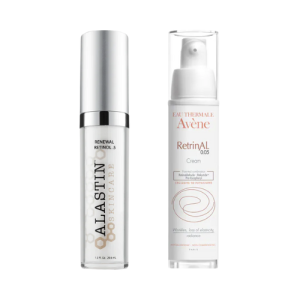
3. Retinols: Best anti-aging ingredient out there.
- These vitamin A derivatives help stimulate the skin’s natural turnover process and increase collagen production in turn improving the appearance of fine lines, wrinkles and discoloration.
- Retinols also exfoliate your skin and prevent clogging of your pores giving your skin a fresher, glowing appearance.
- Retinols are powerful so although they have many benefits they can also cause dryness, irritation and peeling. Our team recommends starting slow by using a small amount, once or twice a week and gradually increasing as tolerated and applying a hydrating moisturizer or HA product on top.
PD Favorites: Alastin Retinol and Avene Retrinal

4. Heparan Sulfate Analog (HSA): Exclusive breakthrough repairing molecule.
- Heparan Sulfate Analog is Senté’s patented technology that supports the skin’s ability to repair from within.
- HSA Technology deeply hydrates and targets the underlying causes of inflammation, strengthening the skin's ability to repair itself.
- HSA reduces the appearance of red, dry, and uneven skin while also combatting fine lines and wrinkles.
- Fantastic anti-aging product for more sensitive red prone skin types.
PD Favorite: Senté Dermal Repair Cream and Senté Dermal Repair Ultra Nourish
What is a Board-Certified Dermatologist?
Pure Dermatology Denver is the proud home to three board-certified dermatologists — Drs. Ghiselli, Cera Hill, and Farahi. March hosts both the American Academy of Dermatology's Annual Meeting, as well as National Doctors' Day. In honor of the medical specialty of Dermatology, let's explore this expansive field of medicine and our talented physicians.
What is a dermatologist?
A dermatologist is a medical doctor who specializes in the diagnosis of skin, hair, and nail conditions.

What training does a dermatologist have?
When it comes to diagnosing and treating conditions that affect the skin, hair, and nails, no one has completed more training than a board-certified dermatologist. Before they can begin practicing, dermatologists receive more than a decade of training, including:
- Four years of college to earn a bachelor’s degree
- Four years of medical school to become a medical doctor
- A year-long internship in medicine
- Three years of residency in dermatology, working alongside experienced doctors and completing 12,000 to 16,000 hours of treating patients
- Some dermatologists will then pursue additional advanced training in a particular area. This is known as fellowship training.
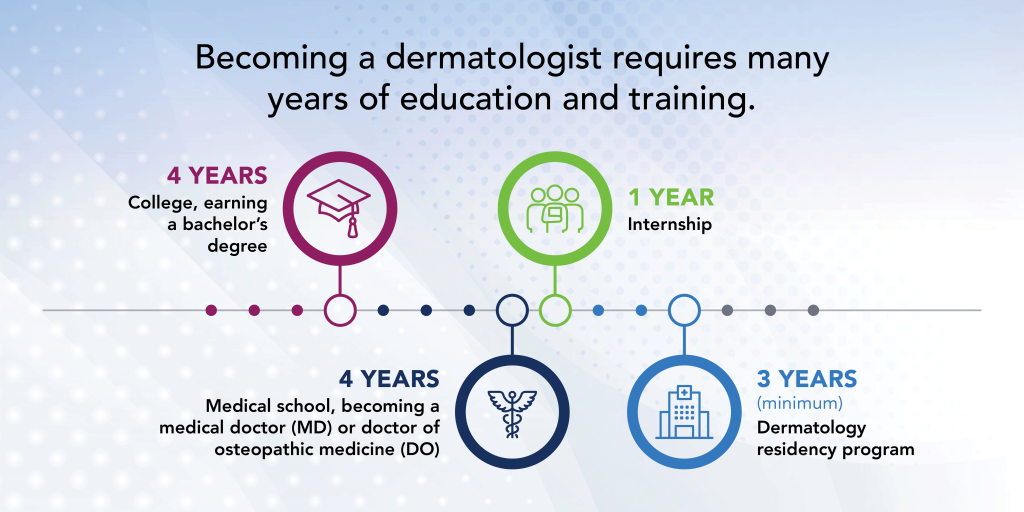
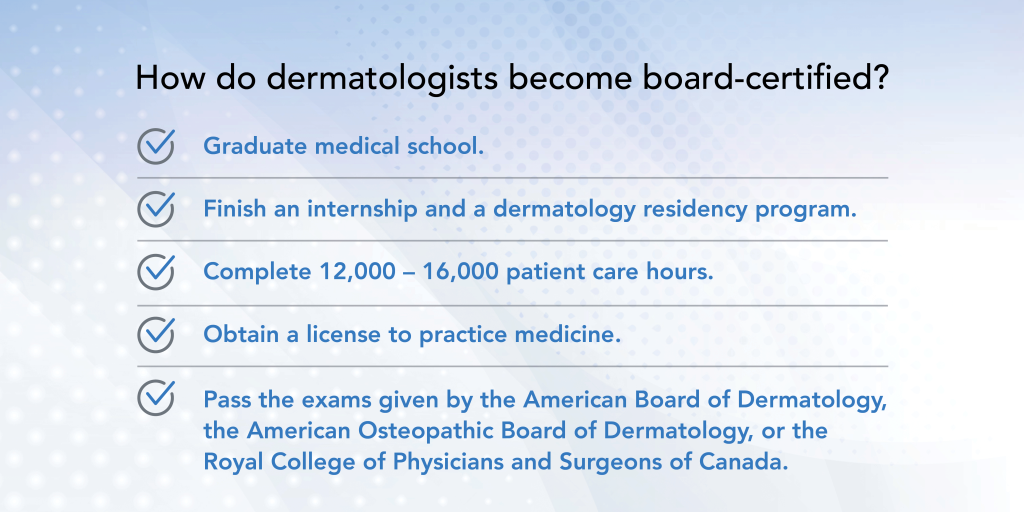
How can I tell if a dermatologist is board certified?
When you see the letters FAAD after their name, you know a dermatologist is board certified. FAAD stands for Fellow of the American Academy of Dermatology.
Why partner with a board-certified dermatologist?
Everyone’s skin is unique. No one understands your skin better than a board-certified dermatologist. When you partner with this expert, you get the best care.
- A board-certified dermatologist knows how to accurately diagnose and properly treat a wide variety of skin conditions from deadly skin cancers to warts.
- Expertise in caring for conditions ranging from long-term diseases caused by problems with your immune system and allergic reactions to hair loss and infections caused by bacteria or viruses.
- Dermatologists understand the interaction between the skin and the rest of the body. What seems like a simple rash might be a sign of an underlying disease.
- When you’re under a dermatologist’s care for a skin condition, your dermatologist can monitor you for other medical conditions.
- Dermatologists also help patients who want help with cosmetic concerns like wrinkles, sagging skin and scarring caused by acne or surgery to remove a skin cancer.
MEET OUR BOARD-CERTIFIED DERMATOLOGISTS
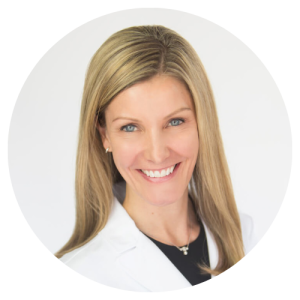
Samantha Ghiselli, MD, FAAD
Board-Certified Dermatologist
Co-Founder of Pure Dermatology Denver
Dr. Ghiselli is a board-certified dermatologist who specializes in medical, cosmetic and surgical dermatology, including Mohs micrographic surgery. Dr. Ghiselli prides herself in caring for the whole patient. She is known to have excellent bedside manner and be very charismatic towards her patients. She enjoys giving back to her community by volunteering her time to educate and provide dermatological care. She loves her profession because of the ways she can improve the lives of others.
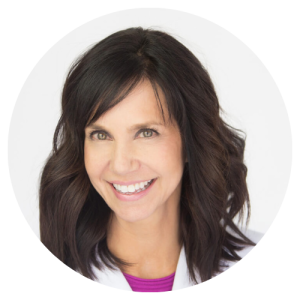
Carrie Cera Hill, MD, FAAD
Board-Certified Dermatologist
Co-Founder of Pure Dermatology Denver
Dr. Cera Hill is a board-certified dermatologist with extensive experience in medical, surgical, and cosmetic dermatology with personal interests in skin of color and pediatric skin. After working for 7 years at Procter & Gamble, she received her MD from The University of Colorado School of Medicine in 2006. During her dermatology residency, she spent time at Northwestern Children’s Memorial Hospital studying pediatric dermatology, and in Santiago, Chile training on the topic of Latino skin.

Dr. Jessica M. Farahi, MD, FAAD
Board-Certified Dermatologist
Dr. Jessica Mounessa Farahi is a board-certified dermatologist practicing medical, surgical, and cosmetic dermatology. With a background in nutritional sciences, she prides herself in providing a holistic approach to treating numerous skin conditions. Dr. Farahi eagerly accepts patients of all ages and has experience performing a variety of cosmetic and surgical procedures. She values getting to know her patients as a whole and treating them with an individualized, patient-centered approach.

National Doctors' Day
National Doctors’ Day in the United States is a holiday which is celebrated on March 30th each year. Let's honor our physicians for the work they do for their patients, the communities they work in, and for society as a whole. It is their hard work and devotion that keeps all of us healthy and this day thanks them for doing that for us and our loved ones.

